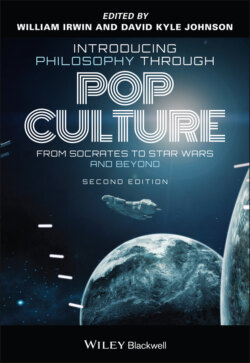Читать книгу Introducing Philosophy Through Pop Culture - Группа авторов - Страница 39
Оглавление
Part II
Epistemology
Introduction
Epistemology is the study of knowledge. Is it even possible to acquire knowledge? If so, how does one acquire it? How should one acquire it? If knowledge really is justified, true belief – which has been contested – what is truth anyway? These are the questions an epistemologist asks.
In Chapter 4, Henry Jacoby takes us to South Park to teach us about the ethics of belief. Blaise Pascal (1623–1662) suggests that belief in God can be rational because, even though it lacks evidence, it is the better bet. In contrast, William Clifford (1845–1879) argues that it is always morally wrong to believe without evidence. Stan Marsh of South Park, Colorado agrees with William Clifford. Stan is critical of belief without (and contrary to) evidence, like Kyle's mom's beliefs in holistic healing, the Mormon belief that the first man and woman lived in Missouri, and John Edward's claims that he can communicate with the dead. Examples from South Park demonstrate the dangers of belief without evidence, such as blindly following David Blaine into a mass suicide, and a mental laziness that, Stan tells John Edward, is “slowing down the progress of all mankind.”
In The Matrix Trilogy, it is revealed that the everyday world humans experience is actually a computer simulation designed to keep humans under control while an artificially intelligent civilization harvests our energy. In Chapter 5, Matt Lawrence uses the predicament in which humanity finds itself in The Matrix to explain what philosophers call “The Skeptical Problem” and Descartes's (1959–1650) solution to it. How can we be sure we're not being deceived on a grand scale like the prisoners of the Matrix?
In Battlestar Galactica, the 12 colonies are destroyed and humanity finds itself looking for a new home. Commander Adama claims he knows the location of the 13th colony – called Earth – when, in fact, he knows nothing of the kind. He simply told a lie to give people hope. It turns out, however, that there actually is an Earth and humanity eventually finds its way there. In Chapter 6, Eric Silverman uses Adama's lie to explore the classic definition of knowledge and the contemporary philosopher Edmund Gettier's conclusion that mere justified, true belief is insufficient for knowledge. The chapter concludes with a discussion of what William Clifford (1845–1879) and William James (1842–1910) have to say about whether holding non‐justified beliefs can be ethical.
In Chapter 7, Ruby Komic examines epistemic resources, the resources held by a community that an individual must draw upon to gain knowledge. Challenging racist stereotypes, Black Panther provides the viewer with epistemic resources in the form of conceptual tools to understand and communicate about Black, and particularly African American, culture and experience.
